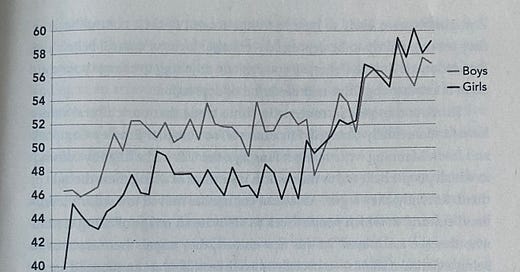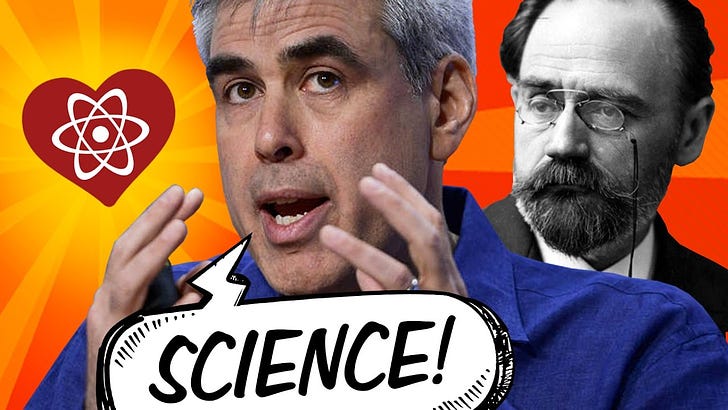Susan Cain, the author of the bestselling books Quiet (about introversion) and Bittersweet (about how within life’s great paradoxes is where we find meaning), also has a newsletter called The Kindred Letters.
In a recent post entitled “How do you tell your own life story?” she references the field of "narrative psychology," which is concerned with the "storied nature of human conduct" or how human beings deal with experience through storytelling or listening to stories.
The writer Julie Beck also explores the concept of “narrative psychology” in a piece in the Atlantic, which hones in on the relationship between the stories we tell ourselves and, ultimately, our personalities.
Beck cites the research of Dan McAdams, a professor of psychology at Northwestern University, and his co-author Erika Manczak. McAdams and Manczak assert that life stories are not merely reflective of our personalities but rather integral components of them.
“Life stories do not simply reflect personality. They are personality, or more accurately, they are important parts of personality, along with other parts, like dispositional traits, goals, and values,” write McAdams and Manczak, in a chapter for the APA Handbook of Personality and Social Psychology.
Another scholar, Jonathan Adler, a professor of psychology at Olin College, proposes that the default mode of human cognition is a narrative mode.
In his research, Adler identified two recurring themes within people's life stories that positively correlate with their overall well-being: agency and communion.
Agency refers to the sense of being in control of one's life, while communion relates to the presence of meaningful relationships.
According to Adler, while the relationship between communion and well-being at a given moment is clear, the predictive power of current communion levels on future well-being remains somewhat ambiguous.
However, agency seems powerful in the moment and the future for our well-being and is most predictive of good mental health.
I find this interesting, as one of the main culprits in the current mental health crisis might be a perceived loss in the sense of agency or a strong internal locus of control, as documented by the intrepid professor Jean Twenge.
Here is a chart looking at the rise in external locus of control among 12th graders:
Studies dating back to the 1960s through the 2000s (Julian B. Rotter in 1966, Bernard Weiner in 1974, and J. A. Bogg and J. A. Roberts in 2004) suggest that individuals with an internal locus of control, who believe they have control over their lives, tend to have better mental health outcomes. They may feel more empowered, confident, and motivated to take action to improve their situation.
On the other hand, individuals with an external locus of control, who believe that external factors or chance determine their outcomes, may be more susceptible to feelings of helplessness and hopelessness. They may feel that they have limited control over their lives, which can contribute to higher levels of stress, anxiety, and depression.
While the research might not yet be fully settled, it is clear that our relationship to our stories is important to our physical and mental health.
Or as Cain puts it,
[In] the field of "narrative psychology," the stories we tell about ourselves are the key to our well-being, the maps we use to find our way through life.
If you’ve interpreted the events of your life to mean that you’re unlucky or unwise, it’s hard to look calmly at the future.
Conversely, if you acknowledge that you’ve made mistakes and faced difficulties but seek redemption, or found meaning, or gained insight, you’ll feel greater agency over your life.
Arranging past events into a narrative serves as a means to comprehend our identities and endeavor to anticipate what lies ahead. It is intriguing because the storytelling technique that appears most incongruous with the complexities of real life is foreshadowing.
Ultimately, narrative psychology offers insight into the profound impact of the stories we tell ourselves. These stories become the guides we use to navigate our lives and, in some cases, shape them.
Speaking of Storytelling
We have a new episode of the podcast coming out on Monday! It is a reflection on our first interview episode with Dr. Belden Lane of Saint Louis University, a masterful storyteller, and the theme we explored: Finding and Experiencing Awe in Everyday Things.
I wrote about Lane in a previous edition of Missives.
Here is how I described him:
Being around Lane, there is an overwhelming sense that you are the presence of someone who lives wholeheartedly. In a visceral sense, it feels like his chest is open, waiting for connection to what is around him. Lane is powerfully brilliant yet humble about all there is to know—and how much each individual one of us doesn’t.
Lane is a teacher in the most authentic sense of what a teacher is. A person who embodies the ideas they are hoping to transmit into the world, and professes them in a way that invites others in, invites others to want to be a part of what they are doing—a person who inspires. The kind of person that when you are in their presence, you wonder to yourself if you could be more like them.
Our interview with Lane was one of the most refreshing conversations for the heart and mind I have had in a long time! So if you haven’t yet, tune in before the Monday pod.
Keep looking for connection,
Attending
I’ve written a lot about why I believe having our attention stolen is so destructive. Today, I want to discuss why holding our attention is so important. This past Saturday, I was in the presence of a remarkable man, professor, and author Belden Lane. Belden spent the last 36 years as a professor at Saint Louis University and is the other of a number of …
Inter-Tribal Warfare
With regard to the recent Forth of July holiday, I thought it would be a good time to explore the work of one of my favorite scholars, Jonathan Haidt, and the insights from his book “The Righteous Mind.” “The Righteous Mind” is a deep dive into the origins of our homo sapien moral psychology. In it, Haidt offers readers a way to see our fellow citizens …







Never thought of this before, but it makes so much sense! Is this the reasoning behind cognitive behavioral therapy-- counselors helping people reshape the stories they tell themselves?